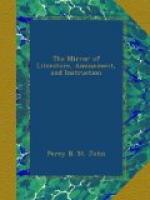He sings—but not the song of
love—
No,—that is for the quick’ning
grove—
The brightly budding tree.
And tho’ we listen and rejoice;
In melody that sweet-ton’d voice
Implores our charity.
The birds of passage take their flight
To other lands—of warmth and
light—
Where orient breezes blow.
While here the little red-breast stays,
And sweetly warbles out his lays,
Amidst the chilling snow.
When the keen North congeals the stream
That sparkled in the summer-beam—
Chink—chink—the
Robin comes.
His near approach proclaims a dearth
Of food upon the ice-bound earth;—
He whistles for our crumbs.
But, like the child of want, he hails
Too oft where avarice prevails—
Devoid of charity;—
Where hearts ’neath rich-clad bosoms
glow,
Yet never feel the inspiring throe
Of tender sympathy.
Tho’ pleas’d with wildly-warbled
song,
The minstrel’s life will they prolong
With food and shelter warm?
No,—see, to shun the cruel
snare,
Again he wings the frozen air,
And dies amidst the storm.
How sweeter far it were to see
The bird familiar, fond, and free,
With confidence intrude;—
To see him to the table come,
And hear him sing o’er ev’ry
crumb
A song of gratitude.
C. COLE.
* * * * *
BUYING AND SELLING THE DEVIL.
(For the Mirror.[3])
“Every thing may be had for money,” is an old remark, and perhaps no less true.
There have been also proverbial sayings of buying and selling the devil; but that such a traffic was actually ever negociated will appear incredible. Blount’s “Law Dictionary,” under Conventio, gives an instance of a sale; it is extracted from the court rolls of the manor of Hatfield, near the isle of Axholme, county of York, where a curious gentleman searched for it and found it regularly entered. There then followeth an English translation for the benefit of those who do not understand the original language.
“Curia tenta apud Hatfield die Mercurii Prov post Festum. Anno II Edw. III.”
Robert de Roderham appeared against John de Ithon, for that he had not kept the agreement made between them, and therefore complains, that on a certain day and year, at Thorne, there was an agreement between the aforesaid Robert and John, whereby the said John sold to the said Robert the devil, bound in a certain bond, for threepence farthing; and thereupon the said Robert delivered to the said John one farthing as earnest-money, by which the property of the said devil rested in the person of the said Robert, to have livery of the said devil on the fourth day next following, at which day the said Robert came to the aforementioned John, and asked livery of the said devil, according to the agreement between them made. But the said John refused to deliver the said devil, nor has he yet done it, &c. to the grievous damage of the said Robert to the amount of sixty shillings; and he has therefore brought his suit, &c.




